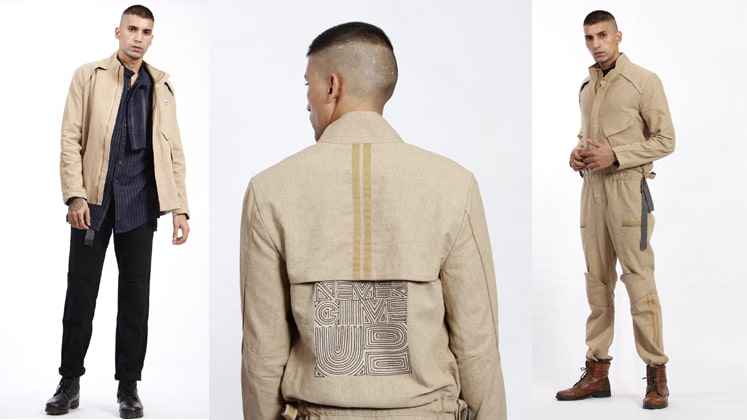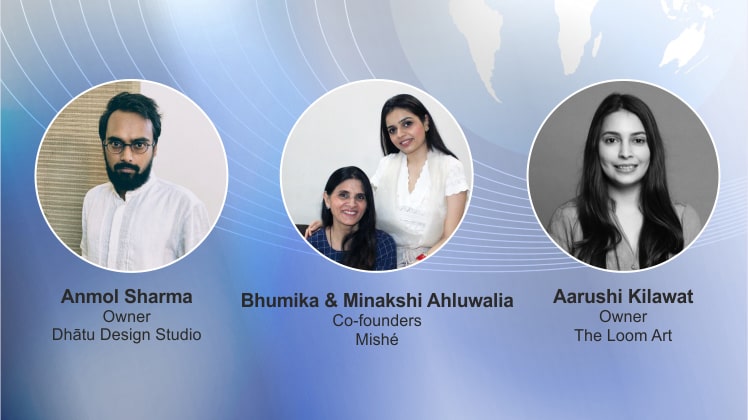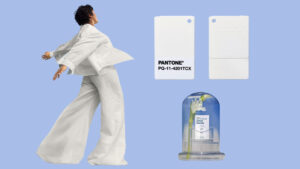The winners of one of the biggest designer launchpads of the Indian fashion industry, Lakmé Fashion Week’s GenNext, are not only special due to the purely digital, season-fluid edition of the fashion week, but also because all three of them have an added core value of sustainability to their arsenal of pure raw talent and a promising future in the industry ahead. Apparel Resources interacts with the winners, Dhātu Design Studio by Anmol Sharma, Mishé by Bhumika & Minakshi Ahluwalia and The Loom Art by Aarushi Kilawat, the 30th batch of GenNext designers, about their labels, the LFW collections and their aspirations from this platform.
Emerging victorious amongst over 200 aspiring participants, the three winning designers had to overcome physical limitations owing to COVID-19 and had to cross all the processes virtually to finally present their collections by INIFD at LFW’s day 1. A video montage to complement the digital presentation to effectively do justice to these designers’ creations was presented to the jury, which encompassed industry bigwigs such as Anaita Shroff Adajania, Amit Aggarwal, Pernia Qureshi, Tina Tahiliani, GenNext mentor Sabina Chopra along with Ashwath Swaminathan, Head of Innovations, Lakmé, and Jaspreet Chandok, Head of Lifestyle Businesses, IMG Reliance.
Post being announced as winners, the three were mentored to achieve understanding of brand building, business and marketing skills in addition to feedback and advice on their upcoming showcase and collection in a series of Masterclasses over 3 days with Sabina Chopra, the LFW team as well as industry experts. LFW had made both day 1 and 2 purely sustainable; the designers and their labels are also known to contribute their part in making fashion conscious.
Also Read: A look into India’s advent into the digital realm with FDCI’s India Couture Week 2020
Mishé by Bhumika & Minakshi Ahluwalia
“We were sceptical about the fashion industry scenario during a pandemic. When we saw LFW is accepting applications for GenNext, we thought of applying for it, as it’s a great platform for upcoming new designers like us,” says Minakshi Ahluwalia, Co-founder, Mishé, while her daughter Bhumika Ahluwalia, Co-founder and Creative Head of the label, chimes in, “We were inspired by sign language to make this collection. The hand gestures and shapes created while using sign language inspired us to make this collection. With Lakmé Fashion Week, we hope to reach our story to women across the globe.”

Mishé is a conscious label that focuses on minimal and zero waste of fabrics while making clothes, through several zero waste as well as Japanese pattern making techniques. The mother-daughter duo started the label in 2018, aiming to introduce creations that are experimental yet wearable and conscious at the same time, something that women can always have in their wardrobes for years.
For their upcoming collection, they went in conjugation with their label’s signatory design language that takes cues from geometry and forms. The collection, Shuwa, which translates to sign language in Japanese, juxtapositioned the shapes and forms created by hand gestures and movements into silhouettes. “I used mainly alphabets to make the silhouettes and other details in the garments,” furthers Bhumika, “Sign language is used by differently abled people to communicate. My professor couldn’t speak or hear but the way he taught us was exceptional! The hand signs and movements created by it inspired me to make this collection.” The fabrics used to make this collection are banana fabric, orange peel fabric, recycled cotton and hand-woven cotton via techniques such as cord fabrication embroidery and thread embroidery and intelligent use of cut-outs and strategically placed fabric manipulations.
The Loom Art by Aarushi Kilawat
A label that focuses on reviving the old and dying authentic craft, embroidery and weaving techniques in this fast fashion dominated world, The Loom Art is a fond effort to give platform to artisans, weavers, embroiderers, sample persons and craftsmen to come together and co create. “I have always believed in designing something that serves a purpose and solves a problem, and I wanted to make voices heard and bring handlooms back in vogue through my designs and my brand,” says Aarushi Kilawat, the talent behind this label, “This need of recognition inspired me to be a part of LFW GenNext, a platform that supports young talent and also works on the same ideologies as we believe in.”

Aarushi’s collection ‘Between The Lines’ employs fabrics with longer shelf life such as Chanderi silk, Matka silk and pure silk, woven in Banaras along with cotton silks made by weavers in Murshidabad, Bengal. Creatively depicting the current uncertain yet pattern-led life we are living, the collection boasted of usage of Arashi Shibori, a lesser known yet more uniwur form of Shibori and had silhouettes such as boxy jackets, double layer dresses with a variation of sleek and oversized shirts in a soothing colour palette of icy blues, whites and teals complemented with ivory, pinks and peaches.
Also Read: Top menswear trends for Spring/Summer 2021 amidst COVID-19
Dhātu Design Studio by Anmol Sharma
With a vision resonating with ‘Dress To Reform’, Dhātu Design Studio is the brainchild of Anmol Sharma and is an ethical business setup to benefit everyone involved in its supply chain by not only doing no harm but also benefiting the environment. “Our core design process is purpose-driven and it fits just right in the current time frame. We did not change the language, only the output. LFW gave us an incredible opening to go all in, whether it is rich fabrics, experimental silhouettes or tight finishing. The platform made the design process limitless, no compromise on the design value or flamboyance. Collaboration is the key and during these unprecedented times, it has become an axiom, and LFW made sure we find like-minded people and organisations to work together in the future,” avers Anmol.

The NIFT Delhi alumnus presented his LFW collection ‘Dress To Reform’ which boasts of circular design approach (designed for disassembly), coupled with protective technical silhouettes. Even the materials employed carry social and cultural values such as GI (geographical indication) registered hand-woven pure pashmina, non-violent hand-woven Bhagalpur Ahimsa silk and hand-woven Mangalagiri cottons. The label has a utilitarian design approach which showcased in the all menswear collection, with embellishments like Phulkari and bullion knots and cross-stitch work, boiler suits with multiple pockets, and hoodies with attached masks to match the current global scenario.
The three labels definitely have a bright future ahead, and acknowledging the same, Ashwath Swaminathan, Head of Innovations, Lakmé, said, “Discovering new talent who will be the future of fashion is one of the key pillars of LFW. We look forward to the 30th batch of the GenNext programme display their collections on the virtual runway and reinvent the paradigms of fashion to be more future fit.”
Talking about the GenNext programme, Jaspreet Chandok, Head – Lifestyle Businesses, IMG Reliance Ltd., said “Despite all the challenges of the pandemic, I’m happy to see the participation and enthusiasm of so many young designers. It is our endeavour to whole-heartedly support them as well as all the GenNext alumni in these trying times.”
In the wake of difficulties presented in front of aspiring new designers due to the pandemic, LFW made sure to support the designers in all the ways possible, right from providing a free stall space in the LFW virtual showroom, but also be a part of the schedule through a lookbook format of showcase without any designer fees. LFW will also support the GenNext designers through promotions on the LFW digital handles for the next 6 months to help them market their brands.
Also Read: Cruising through Resort 2021: A roundup of the top trends of the season








